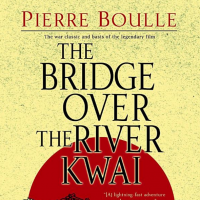A war between nations is innately a clash of cultures. Pierre Boulle's best-selling novel "The Bridge Over the River Kwai," first published in English in 1954 and made into a movie by David Lean, mixes military fiction with the cultural pride and folly of the Asia-Pacific War. It is a lean, jumpy book, a Conradian tale of the British lost in a dark abroad.
The Bridge Over the River Kwai, by Pierre Boulle.
224 pages
PRESIDIO PRESS, Fiction.
The story unfolds in a Japanese prison camp, where Allied POWs are forced to build a railway bridge connecting Siam (Thailand) and Burma (Myanmar). Under harsh conditions and the haughty perfectionism of Colonel Nicholson, the men rally to the labor of construction, turning the bridge into a symbol of work ethic and national honor, "a masterpiece which was to prove the superiority of the West."
As the prisoners help the Japanese to invade India, a commando from British Intelligence arrives in the jungle to destroy the bridge. The shocking finale, which differs from the movie, reaps futility on both sides.
The novel's racism against the Japanese blends subversively with Nicholson's betrayal. His prideful urge to "do a job properly" is mirrored by the warden Colonel Saito, who hates the British and abuses his prisoners out of fear they might not take him seriously. The relationship of the two characters mirrors that of Imperial Japan's relationship with the West.
In the end, Boulle, who was himself held in Japanese captivity — and later wrote "Planet of the Apes" — holds that both sides were desperately trying to save face.
Read archived reviews of Japanese classics at jtimes.jp/essential.



















With your current subscription plan you can comment on stories. However, before writing your first comment, please create a display name in the Profile section of your subscriber account page.